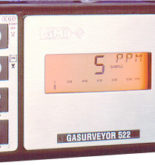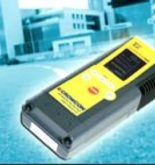Working in confined spaces is difficult at the best of times. Operators often have to wear full PPE (personal protective equipment), are usually harnessed and may be carrying tools and equipment to complete the task in hand (e.g. welding). The last thing a worker in this environment needs to worry about is his or her gas detector. It should be designed specifically for confined space entry (CSE) applications, be unobtrusive and have a clear display that is easy to see at a glance.
According to the UK’s Health and Safety Executive (HSE) a confined space means ‘any place, including any chamber, tank, vat, silo, pit, trench, pipe, sewer, flue, well or other similar space in which, by virtue of its enclosed nature, there arises a reasonably foreseeable risk’.
This definition covers just about any industrial activity but is especially applicable to the utilities industries (water and wastewater, electricity, telecommunications and gas), construction, hydrocarbon
exploration and processing, petrochemicals, marine applications, agriculture, food processing, wine making and brewing, as well as emergency services.
While the best advice is, if at all possible, to avoid entering confined spaces, this is obviously not always an option. In the above mentioned industries there will always be occasions when workers or emergency services personnel need to enter potentially dangerous areas to carry out inspections, routine maintenance, perform emergency repairs or effect rescues.
There is a wide range of equipment required for CSE environments and the supply industry is well developed, with a plethora of PPE and safety equipment available. The one area of CSE where improvement is needed and where compromises have, to date, always had to be made, is gas detection.
Users of gas detectors have typically had to make a choice between large pumped units, small diffusion models, or models with ‘parasitic’ pumps, which are easily lost or damaged. Handheld detectors
that measure a wider range of gases tend to have front-mount displays and are usually optimised for leak location or ‘hot work’ permit issue, rather than being suitable for CSE work.
So, what are the requirements of the ‘ideal’ CSE gas detector? Crowcon has done extensive market research among users and fleet managers around the globe and found the following five features to
be essential:
• Simple to use.
• Bright, easy to read display.
• Long battery life (for at least one full shift, and preferably two).
• Robust construction.
• Reliable detection (while not being the focus of the task at hand, unreliable detectors can halt it quickly).
These features may all seem obvious, but finding a gas detector that includes all of them, as well as other important characteristics has, until now, been impossible.
With this feedback in mind, Crowcon went back to the drawing board and did not simply update its existing CSE portable gas detector. The result is Gas-Pro, a design perfectly suited for CSE applications to comply with hazardous area and health and safety standards.
Specific CSE features of the new Gas-Pro include:
• It is compact and comparable in size to leading frontmount diffusion detectors. It is designed so as not to get in the way of other PPE and accessories and not interfere with the worker’s primary activity.
• It has a bright, clear top-mount display that can be read at a glance without having to even touch the detector. A dual colour backlight adds an extra level of alert should the Gas-Pro enter alarm status.
• An internal pump means that pre-entry testing can be done quickly and easily. This also keeps the size of the detector small and removes the problems of poor sealing or the need for extra equipment and chargers associated with parasitic pumps.
• +ve Safety™ – The status of detectors is becoming more and more important to fleet managers. Health and safety executives around the world (OSHA, HSE, Safework Australia, to name but a few) are introducing and making more stringent the guidelines and regulations released to ensure worker safety. Unique to the Gas-Pro, +ve Safety™ provides tri-colour status indication, giving quick and effective monitoring of gas test (bump), calibration, over range and recent alarm notification. Not only is +ve Safety™ flexible enough to meet individual company regulations, but the indication light is visible to all, offering the fleet manager a quick, simple, yet comprehensive visible indication of monitor status, unlike standard bump test –indications or confidence flashes.
• Multiple gas sensors for up to five potentially hazardous gases from an extremely wide range including, hydrogen sulphide, carbon monoxide, carbon dioxide, oxygen and flammable gases, as well as industryspecific gases such as ozone, ammonia, chlorine, chlorine dioxide and sulphur dioxide.
• In addition, Gas-Pro is extremely rugged and has IP65 &IP67 ingress protection with an extremely loud >95 dB alarm as well as a vibrating and dual colour visual warnings as standard.
Crowcon’s new Gas-Pro CSE detector is therefore a new category of product designed for just one purpose – ensuring gas safety in confined spaces. Free from worries about what risks might come with compromise, personnel entering these spaces will be more focussed on their core activities, safe in the knowledge that their gas detector is focused on its core activity.
Louise Early, Safety Portables Product Manager at Crowcon Gas Detection Instruments Ltd.



